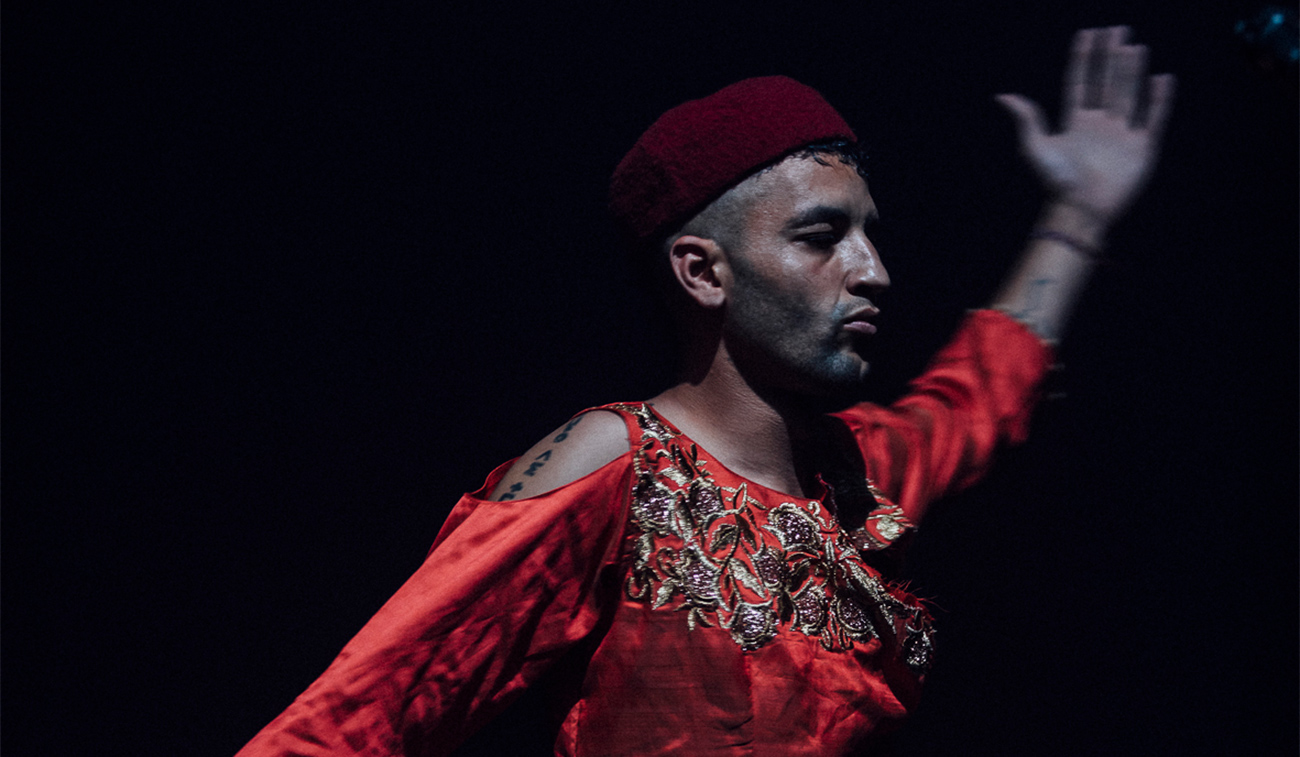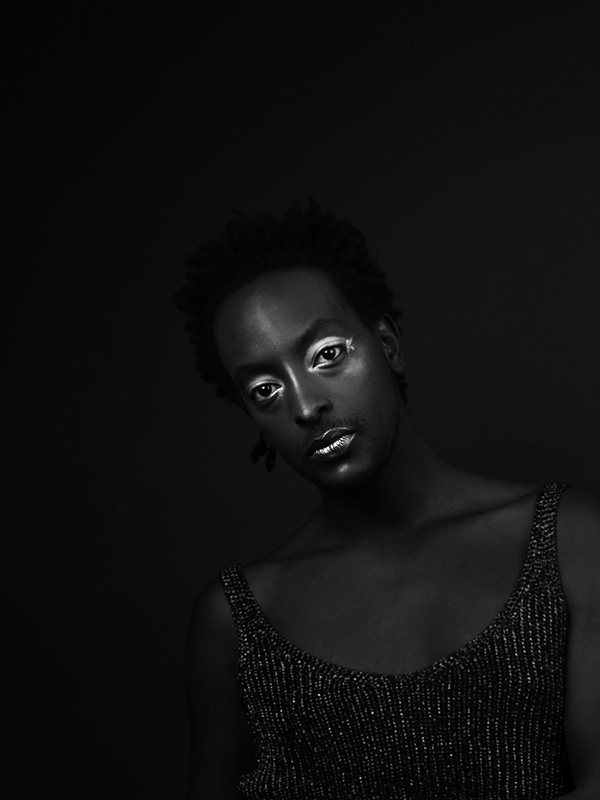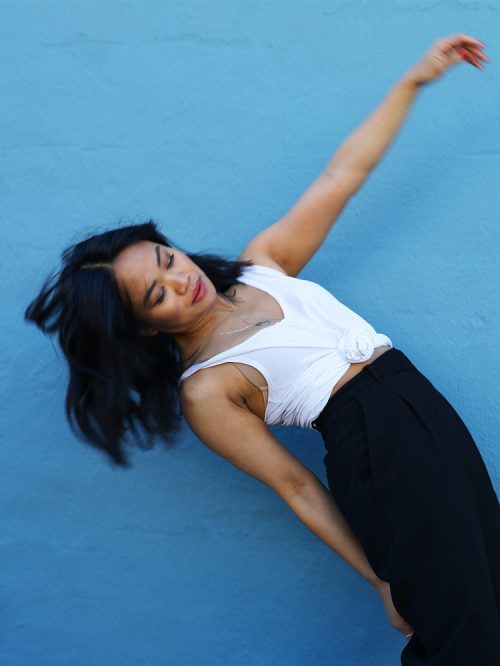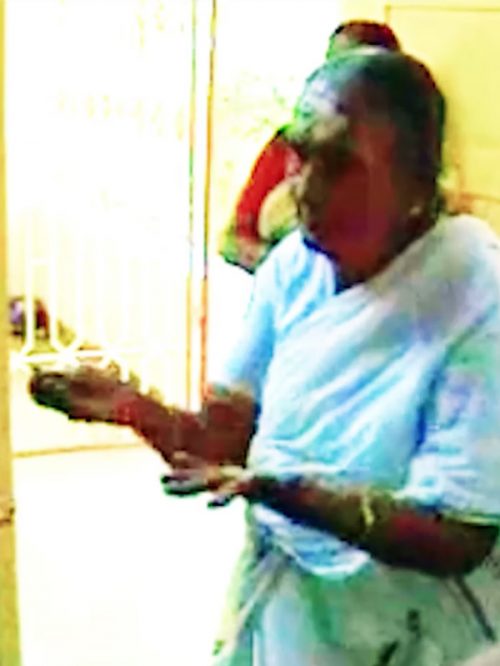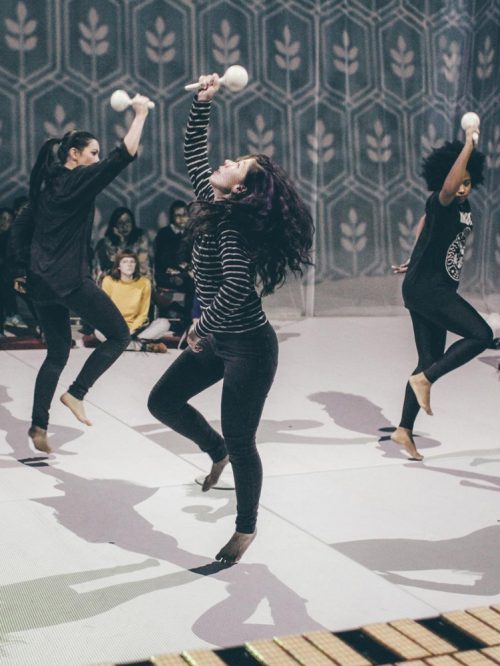Fragments towards the possible
FRAGMENT I
A kaleidoscope of sound filled the room; a Muslim call to prayer the world fell at Malas’s feet, anguish so heavy filling the fault lines. They danced like no one was watching, except the room was packed to the brim. Mala: is a gender non-conforming performance artist, writer, and political activist from Morocco. Their Performance nLabyeeka Ya Hussein (“Oh Hussien”), was presented at the festival “Queer, and Now from stonewall to queertopia” held at the Munich kammerspiele in July 2019. They transformed the room into a sacred space in a decolonizing ritual. A ritual evoking insatiable sadness, I would like to say. A single teardrop fell from my eyes. They start with a cleaning practice to perform a prayer where ritual purity is required. This is achieved by a prayer aesthetic – partial washing or Wudu as it is also called in Arabic. They then dive deeper into the dance, spinning, thumping shoulders, and stamping heavily onto the stage. Mala’s performances emerge from their personal experiences.
Mala’s Performance reconfigures complex notions of identity as a queer Muslim into a structure of feeling, opening spaces of inquiry to reclaim Islam as queer, as resistance to authoritarian concepts of the Muslim faith.
In “Disidentifications: Queers of color and the Performance of politics,” Jose Esteban Munoz defines Disidentification as a performative mode of tactical recognition that various minoritarian subjects employ to resist the oppressive and normalizing discourse of dominant ideology.[1] “A reformatting of self within the social” Mala’s performance ¨nLabyeeka Ya Hussein” embodied an ambiguity, a queer transfiguration of Islam. I watched and was awakened to the shifting horizons of possibility.
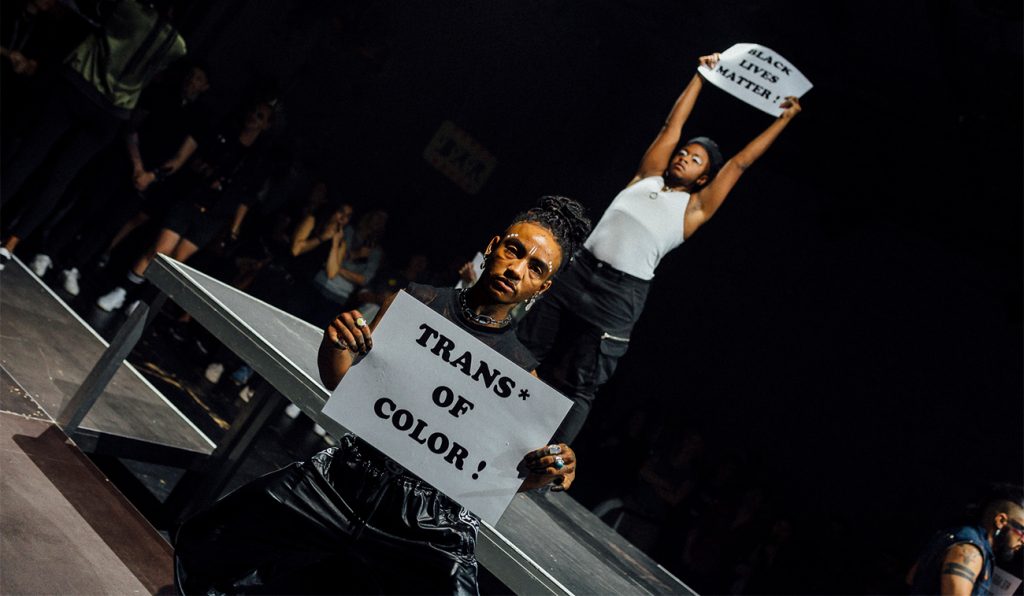
FRAGMENT II
Rae stood a lone figure on the highest platform in all his power, Voguing in their Performance collaboration with the Munich-based activist collective Beyond Color. This performance combined protest and Voguing, focusing on bringing political expression into the exploitation of the ballroom scene.
Voguing, commercially known through Madonna’s ‘Vogue,’ is a dance style developed in the 1960s within the Black, Latinx, and Gay Ballroom Scene of Harlem/New York. Deeply rooted in New York’s LGBT community, Voguing took a journey through underground clubs in the U.S. and Europe. Voguing is inspired by the fashion magazine Vogue, its model-like poses, and the High Fashion Runway Walk. With the styles Old Way, New Way, and Vogue Fem, this dance combines masculine poses from Breakdance and Martial Arts, feminine posing and gestures, very flexible poses, and the hitting of angels, boxes, and lines with the body/arms on the beat.
The lines, symmetry, and precision were executed with grace and power; Rae was in top form, a vision to behold. Almost a year after his performance, Rae reflects on the experience via their Instagram account:
“Often, when people think about the ballroom scene, they talk about how fierce and fab everyone is. But for me, and I think for many black people in the scene, Ballroom allows us to center our bodies as spaces for pleasure, joy, and resistance. Primarily when our bodies are understood as sites of violence. Some think that it is just for fun, but I often ask people why do you think we dance so hard.” When I read this, I thought about what it means to create and curate black Queer and trans* artistry in a space whose history named our bodies as a site of violence.
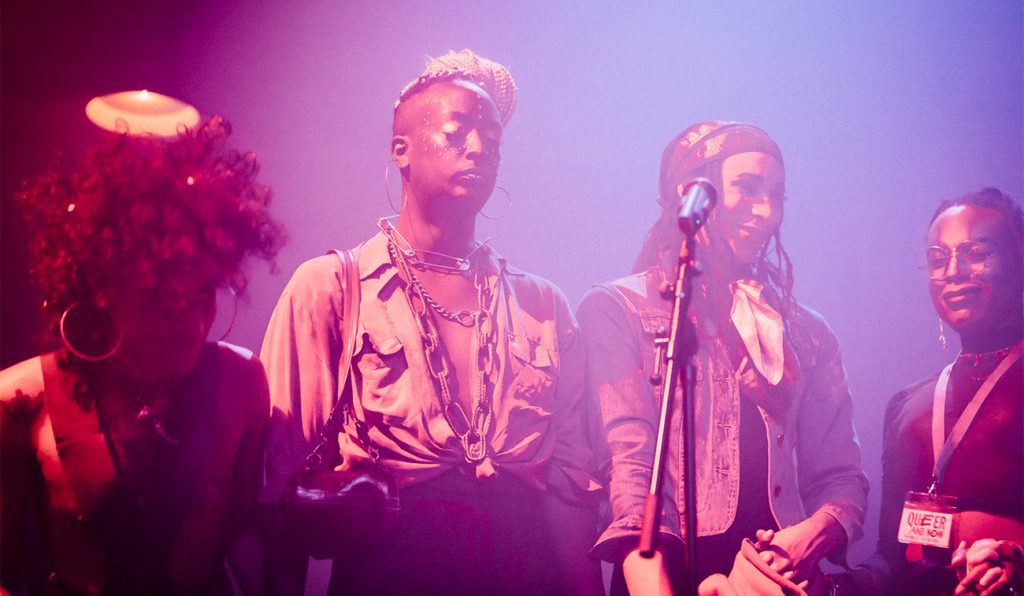
FRAGMENT III
“My heroes had the heart to lose their lives out on the limb
And all I remember is thinkin’ I wanna be like them
Ever since I was little
Ever since I was little, it looked like fun
And it’s no coincidence I’ve come
And I can die when I’m done
But maybe I’m crazy
Maybe you’re crazy. Maybe we’re crazy Probably.”
Naya Lips syncs to the Gnarls Barkley classic “Crazy” before going into one of her renowned comedy numbers. Naya, better known by her stage name Lux Venérea, is from Sertão of Brazil and is now based in Berlin. Apocalypse avant gardist. Tragic comedian. Underdeveloped activist. Fashion terrorist. Chef de cuisine. Believes in performance art as a way to re-experience the body and comedy as a tool to study oppression. Aims for unlearning, destruction and disobedience through her practices. Naya uses every medium she can to express the lost things in translation from language to language and the use of colonized languages themselves. Being herself a medium in fantasies-fetishist autobiographical storytelling, she holds vulnerability as a weapon pointed to the viewers. From comedy to profound “non-sober poetry”, she attempts to drive the viewers from tear to laugh with lots of friction to indicate the constant state of trauma surrounded by laughs/normalization experienced by herself and other dissident bodies.
Nayas performance at the Queer and Now festival spoke to trans prejudice, that is to say, harmful stereotyping and discrimination of Transgender persons through the pathologization of Trans Identities as a mental illness and the stigmatization of people living with HIV. We had recently shared a stage as performers at the Pugs in Love Festival held at the Maxim Gorki Theatre in Berlin where she had been harmed; A conversation I would not like to rehash. In selecting her work to be shown on the stage of Kammerspiele, I wanted to offer her space for creative rage and empowerment and healing. I wish to suggest that this moment was one of mutual healing for the audience as well. A joke about Transgender persons is best heard from us; she said, “I was assigned problematic at birth”. We laughed from deep within our bellies, and isn’t laughter medicine for the soul?
Fragment IV
From Latin cūrātor (“one who has care of a thing, a manager, guardian, trustee”), from cūrāre (“to take care of”), from cūra (“care, heed, attention, anxiety, grief.)”
This was the first festival I curated in an institutional space; I learned a lot about caring, care work involved in selecting artists and dramatizing the entire production. It is truly a labor of love to involve oneself in this backbreaking work. Backbreaking because, of course, incidences of racism occur, negotiation of the white gaze, all this must be considered. A herculean task for one single Black Trans Body. I must admit there was a naivety when I first approached this work, but we live and learn not just from the space of identity but also from the multiple horizons of experience.
I would like to circle back to the thought about what it means to create and curate Queer and trans* artistry in spaces whose histories named our bodies as a site of violence. Does this directly address the structures of violence? I think not; what it does, however, I would like to believe, is offer hope and unleash our imaginations into more effective forms of representation for the marginalized and Minoritized. Representation is essential; it opens up infinite territory for the possibility of empowerment.
Fragment V
I wrote a poem, and the poem killed me; the poem asked my name. I did not have the answer.
Audre Lorde’s seminal essay Poetry is not a luxury; she writes, “sometimes we drug ourselves with dreams of new ideas. The head alone will save us. The brain alone will set us free. But there are no new ideas still waiting in the wings to save us as women, as humans; there are only old and forgotten ones, new combinations, extrapolations, and recognitions from within ourselves, along with the renewed courage to try them out.”[2]
I am carrying these words.I hold an insatiable sadness as I write this; perhaps it is a longing for the innocence lost while doing this work or a sense of failure for having not cared enough; maybe it’s the question that runs deep in my veins: Who cares for the carer?
I wrote a poem, and the poem killed me; the poem asked my name. I did not have the answer.
“One is not born but rather becomes a body. And one is not born but rather becomes a glitch. The glitch becoming is a process, a consensual diaspora toward multiplicity that arms us as tools, carries us as devices. Sustains us as technology while urging us to persist, survive, stay alive.” Glitch Feminism
To begin again is to birth oneself; it is to become, I am starting again. Courage!
Suggested Citation:
Keith Zenga King. 2021. “Fragments Towards the Possible.” In: Moving Interventions 1: Ambiguous Potentials // Performative Awakenings , December 2021. Edited by / Herausgegeben von: Sarah Bergh and Sandra Chatterjee, with Ariadne Jacoby (CHAKKARs – Moving Interventions), translated by: Anja Tracksdorf, copyedited by: Veronika Wagner. Published by / Veröffentlicht von CHAKKARs – Moving Interventions.
[1] Muñoz, Jose Esteban. 1999. Disidentifications: queers of color and the performance of politics, Cultural studies of the Americas; v. 2. Minneapolis; London: University of Minnesota Press, p.11.
[2] https://genius.com/Audre-lorde-poetry-is-not-a-luxury-annotated
About the author
Keith Zenga King is a multi-disciplinary artist, writer and curator from Uganda based in Munich, Her work lives at the intersection of queer discourse, performance and politics. (Photo by Camilla Berrio)


